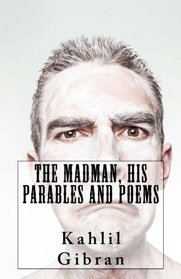Search -
The Madman, his Parables and Poems
The Madman his Parables and Poems
Author:
The madman, his parables and poems is a short work by Kahlil Gibran. Kahlil Gibran (January 6, 1883 ? April 10, 1931) was a Lebanese-American artist, poet, and writer of the New York Pen League. Kahlil Gibran was born in the town of Bsharri in the Mount Lebanon Mutasarrifate, Ottoman Empire (north of modern-day Lebanon), to Khalil Gibran and Kam... more »
Author:
The madman, his parables and poems is a short work by Kahlil Gibran. Kahlil Gibran (January 6, 1883 ? April 10, 1931) was a Lebanese-American artist, poet, and writer of the New York Pen League. Kahlil Gibran was born in the town of Bsharri in the Mount Lebanon Mutasarrifate, Ottoman Empire (north of modern-day Lebanon), to Khalil Gibran and Kam... more »
ISBN-13: 9781535559249
ISBN-10: 1535559241
Publication Date: 7/27/2016
Pages: 44
Rating: ?
ISBN-10: 1535559241
Publication Date: 7/27/2016
Pages: 44
Rating: ?
0 stars, based on 0 rating
Publisher: CreateSpace Independent Publishing Platform
Book Type: Paperback
Other Versions: Hardcover
Members Wishing: 0
Reviews: Amazon | Write a Review
Book Type: Paperback
Other Versions: Hardcover
Members Wishing: 0
Reviews: Amazon | Write a Review
Genres:




